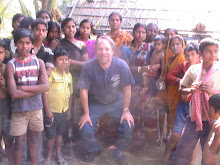Dr. Subramanian Swamy: A Man to Emulate
The day that Dr. Subramanian Swamy left the United States, Gallop published a poll in which the American people said that ending corruption in government was their second most important issue after the economy and job creation. Someone should have asked him to stay. South Asia has long been known as a place where government corruption is so endemic, so tolerated that people just have to accept it. I've personally confirmed massive corruption on India's eastern frontier, extending to all levels of government and having tentacles that reach into almost every area of life in the region. In one investigation, we found we even found a position at virtually every police station, Dak Master, in charge of collecting graft. People might remember when Pakistan had a prime minister nicknamed "Mr. Ten Percent" because of the kickbacks he demanded and received. Or how President Barack Obama was laughed at when he told Afghan President Hamid Karzai that he had to end corruption in his country.
So it had to come as a shock when I arrived in India a couple years ago and found the country awash in open outrage about corruption, media attention about it, and legal cases against corrupt officials. And it was all leading to successful actions. What could possibly be behind such a sea change that no one thought possible a mere weeks earlier? It is 72 year old, former cabinet minister Dr. Subramanian Swamy. Known to many Indians as a "one man army," Dr. Swamy has never shrunk before a challenged or worried what others might think of him. "I don't care," he kept repeating to me and others recently outside of Chicago when asked about the reactions of people from Harvard academics to India's strong-woman Sonia Gandhi.
Subramanian Swamy, a Harvard educated economist, has a long list of accomplishments that run from furthering relations between India and China to helping to revamp trade relations between developed and developing nations. Although Swamy is known for his forthright and unequivocal positions on fighting the continued terror war against India and Islamist terrorism, few people remember that he went on a fast for more than a week in 1987 when Muslim youths were killed in police custody and eventually prosecuted the matter in court.
But in 2008, Swamy's attention turned to overcoming perhaps the nation's most formidable obstacle when he publicly took on corruption. He filed petition after petition against high officials--having many ignored by the current Congress government--but refused to stop and eventually secured indictments against high officials. He continues to pursue corruption cases against some of India's most powerful political individuals.
Swamy is able to do this not only because of his skills and intelligence (his is one of the most incisive minds I have ever encountered) but also because he refuses to back down from principle merely because of what others might think. It is a rare quality among public figures (and is probably one reason why Swamy, though an influential politician, has steered clear of joining either of India's major parties). It was also on view for two nights outside of Chicago last week.
Swamy was here to energize Hindus and strengthen their ties to their religious and cultural heritage--another issue which many people might despair of taking on. But under Subramanian Swamy, it seems to be working. Perhaps most impressive was the fact that Hindu youth (and I saw the same phenomenon in India) flocked to the septuagenarian and expressed tremendous admiration for his personal integrity and strength.
Let's see: relations between the world's two largest nations; the system of international trade; corruption in South Asia; and strengthening Hindu heritage and intensity world wide. What's next for this remarkable individual, stopping terror?
Perhaps as he is an outspoken leader in that effort despite threats and more. And along those lines, in February this year, Dr. Swamy cut short a trip to Sri Lanka and flew back to New Delhi specially to be the principle speaker of my book launch. The book, A Quiet Case of Ethnic Cleansing: The Murder of Bangladesh's Hindus, documents the ongoing destruction of the Hindu community Bangladesh and the world's tacit approval of it through its silence and inaction. It also makes the case for understanding this human rights travesty and moral failure on our part as an integral element in the spread of radical Islam. Dr. Swamy has since complimented the book and me many times, and I appreciate his endorsement. The book is available online for US, Indian, and other readers.
Labels: A Quiet Case of Ethnic Cleaning, Bangladeshi Hindus, corruption, Dr. Subramanian Swamy, Hindus

